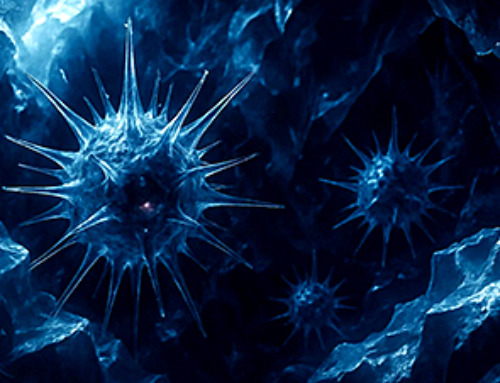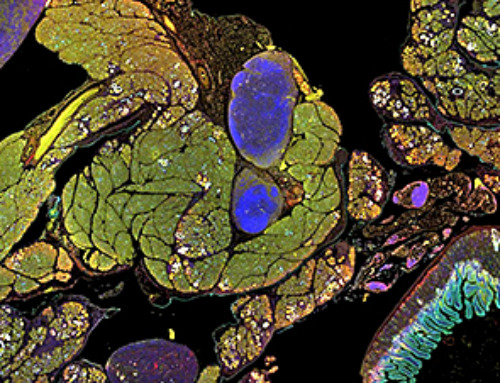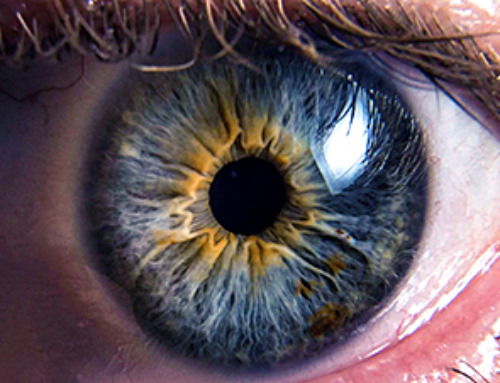Exclusive: study raises hopes that Covid-related damage to sense of smell may be more superficial than previously feared.
The virus that causes Covid-19 does not infect human brain cells, according to a study published in the journal Cell. The findings will raise hopes that the damage caused by Sars-CoV-2 might be more superficial and reversible than previously feared.
The study contradicts earlier research that suggested the virus infects neurons in the membrane that lines the upper recesses of the nose.
This membrane, called the olfactory mucosa, is where the virus first lands when it is inhaled. Within it are olfactory sensory neurons (OSNs), which are responsible for initiating smell sensations. They are tightly entwined with a kind of support cell called sustentacular cells.
In the new study, Belgian and German researchers claim that the virus infects sustentacular cells but not OSNs. “That is just a critical distinction,” said the senior author Peter Mombaerts, who directs the Max Planck Research Unit for Neurogenetics in Frankfurt, Germany. “Once you believe that olfactory neurons can be infected, there is a quick route into the olfactory bulb and then you’re in the brain already.”
The olfactory bulb, at the front of the brain, is where neural input about odours is first processed. If the virus penetrated this structure it could theoretically spread to deeper brain regions where it could do lasting damage – especially since, unlike OSNs, most neurons are not regenerated once lost.
But if the virus only infects the sustentacular cells, then the damage could be less long-lasting.
Both pathways could explain the olfactory dysfunction that afflicts an estimated half of all Covid-19 patients. In one in 10 of those, the loss or change of smell is long-term, perhaps permanent.
Mombaerts says this could be the result of support for the OSNs breaking down, even if they themselves are not infected. They may function below par, or stop functioning altogether, until the sustentacular cells regenerate.
The group has not looked at other neurological symptoms of Covid-19, such as the fatigue and “brain fog” that accompany long Covid.
Nobody doubts that the central nervous system is affected by the disease; the debate concerns whether these effects are due to the virus infecting neurons or some more indirect mechanism, such as an inflammatory response in the blood irrigating the brain – with different implications for prognosis and treatment.
The findings are likely to prove controversial because of the difficulty of studying molecular events unfolding in the moments after infection. Earlier studies made use of animal models, clusters of neural stem cells grown in a dish, and postmortem tissue taken from small numbers of Covid-19 patients. The present study is the largest in Covid-19 patients to date, and it deployed a novel technique for capturing those early events.
Laura Van Gerven, a neurosurgeon at the Catholic University of Leuven in Belgium and another of the paper’s senior authors, adapted a form of skull base surgery to remove tissue from the olfactory mucosa and bulb of Covid-19 patients within about an hour of their death. In 30 of the patients, the researchers were able to detect that the virus was still replicating – meaning the patients had died in the acute, contagious phase of the disease.
“It is unquestionably the most thoroughly done bit of work on human postmortem olfactory Covid tissue,” said Stuart Firestein, a neurobiologist at Columbia University in New York City.
But Firestein said the results did not shed much new light on how Covid-19 causes olfactory dysfunction. “They do not show any OSNs as being damaged or there being fewer of them, or the OSNs near infected sustentacular cells as being different in any way from those not near infected cells,” he said.
Debby Van Riel, a virologist at Erasmus University in Rotterdam, the Netherlands, also praised the study’s rigour, but said the authors’ claim that Sars-CoV-2 does not infect neurons was “pretty bold”.
In only six of the 30 patients was the virus detectable in the olfactory mucosa itself. “Overall the numbers are thus really low to make any strong conclusions,” she said.
But even if the study isn’t the last word on Covid’s brain effects, it does indicate that those dire early reports weren’t either. If its conclusions are borne out, those experiencing Covid-related anosmia or parosmia can be reassured that the virus has not infected their brains, and that future therapies targeting the understudied sustentacular cells could alleviate or cure their condition.
News
Studies detail high rates of long COVID among healthcare, dental workers
Researchers have estimated approximately 8% of Americas have ever experienced long COVID, or lasting symptoms, following an acute COVID-19 infection. Now two recent international studies suggest that the percentage is much higher among healthcare workers [...]
Melting Arctic Ice May Unleash Ancient Deadly Diseases, Scientists Warn
Melting Arctic ice increases human and animal interactions, raising the risk of infectious disease spread. Researchers urge early intervention and surveillance. Climate change is opening new pathways for the spread of infectious diseases such [...]
Scientists May Have Found a Secret Weapon To Stop Pancreatic Cancer Before It Starts
Researchers at Cold Spring Harbor Laboratory have found that blocking the FGFR2 and EGFR genes can stop early-stage pancreatic cancer from progressing, offering a promising path toward prevention. Pancreatic cancer is expected to become [...]
Breakthrough Drug Restores Vision: Researchers Successfully Reverse Retinal Damage
Blocking the PROX1 protein allowed KAIST researchers to regenerate damaged retinas and restore vision in mice. Vision is one of the most important human senses, yet more than 300 million people around the world are at [...]
Differentiating cancerous and healthy cells through motion analysis
Researchers from Tokyo Metropolitan University have found that the motion of unlabeled cells can be used to tell whether they are cancerous or healthy. They observed malignant fibrosarcoma [...]
This Tiny Cellular Gate Could Be the Key to Curing Cancer – And Regrowing Hair
After more than five decades of mystery, scientists have finally unveiled the detailed structure and function of a long-theorized molecular machine in our mitochondria — the mitochondrial pyruvate carrier. This microscopic gatekeeper controls how [...]
Unlocking Vision’s Secrets: Researchers Reveal 3D Structure of Key Eye Protein
Researchers have uncovered the 3D structure of RBP3, a key protein in vision, revealing how it transports retinoids and fatty acids and how its dysfunction may lead to retinal diseases. Proteins play a critical [...]
5 Key Facts About Nanoplastics and How They Affect the Human Body
Nanoplastics are typically defined as plastic particles smaller than 1000 nanometers. These particles are increasingly being detected in human tissues: they can bypass biological barriers, accumulate in organs, and may influence health in ways [...]
Measles Is Back: Doctors Warn of Dangerous Surge Across the U.S.
Parents are encouraged to contact their pediatrician if their child has been exposed to measles or is showing symptoms. Pediatric infectious disease experts are emphasizing the critical importance of measles vaccination, as the highly [...]
AI at the Speed of Light: How Silicon Photonics Are Reinventing Hardware
A cutting-edge AI acceleration platform powered by light rather than electricity could revolutionize how AI is trained and deployed. Using photonic integrated circuits made from advanced III-V semiconductors, researchers have developed a system that vastly [...]
A Grain of Brain, 523 Million Synapses, Most Complicated Neuroscience Experiment Ever Attempted
A team of over 150 scientists has achieved what once seemed impossible: a complete wiring and activity map of a tiny section of a mammalian brain. This feat, part of the MICrONS Project, rivals [...]
The Secret “Radar” Bacteria Use To Outsmart Their Enemies
A chemical radar allows bacteria to sense and eliminate predators. Investigating how microorganisms communicate deepens our understanding of the complex ecological interactions that shape our environment is an area of key focus for the [...]
Psychologists explore ethical issues associated with human-AI relationships
It's becoming increasingly commonplace for people to develop intimate, long-term relationships with artificial intelligence (AI) technologies. At their extreme, people have "married" their AI companions in non-legally binding ceremonies, and at least two people [...]
When You Lose Weight, Where Does It Actually Go?
Most health professionals lack a clear understanding of how body fat is lost, often subscribing to misconceptions like fat converting to energy or muscle. The truth is, fat is actually broken down into carbon [...]
How Everyday Plastics Quietly Turn Into DNA-Damaging Nanoparticles
The same unique structure that makes plastic so versatile also makes it susceptible to breaking down into harmful micro- and nanoscale particles. The world is saturated with trillions of microscopic and nanoscopic plastic particles, some smaller [...]
AI Outperforms Physicians in Real-World Urgent Care Decisions, Study Finds
The study, conducted at the virtual urgent care clinic Cedars-Sinai Connect in LA, compared recommendations given in about 500 visits of adult patients with relatively common symptoms – respiratory, urinary, eye, vaginal and dental. [...]





















